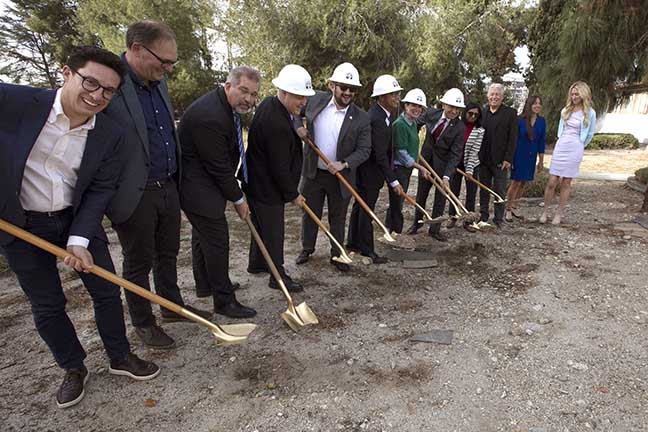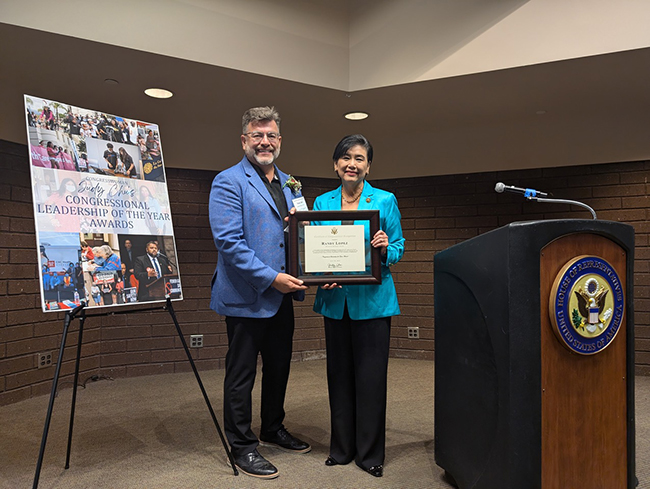Long delayed affordable housing project Claremont Gardens is a go

Regional housing officials joined the Claremont City Council and other city officials Monday to break ground on Claremont Gardens, an affordable housing project on Base Line Road. When completed in 2025 it will be permanent supportive housing for 15 formerly unhoused seniors. Courier photo/Steven Felschundneff
by Steven Felschundneff | steven@claremont-courier.com
An affordable housing project delayed by funding challenges and bad timing will begin construction early next year on an underutilized plot of land in north Claremont.
To celebrate, a broad spectrum of people involved in the construction of affordable housing gathered Monday for the groundbreaking of Claremont Gardens, which will house 15 to 30 low-income seniors once the project is completed sometime in 2025.
The development, at 956 W. Base Line Road, will include 15 one-bedroom units around a landscaped courtyard with six parking spaces. An existing single family home will be transformed into a common use area where residents can access services or simply gather to socialize.
Residents will be “special needs” seniors, including those with mental health challenges, who are unhoused or in danger of losing housing. The units will be available for singles and couples.
Bringing Claremont Gardens through the long funding process was a cooperative effort by the Claremont City Council, Los Angeles County, the San Gabriel Valley Regional Housing Trust board, Restore Neighborhoods LA, Tri-City Mental Health, the California Department of Housing and Community Development and Genesis LA Economic Growth Corporation.
Tri-City bought the roughly .84 acre of land in 2015 and has been using the single family home as a residence for some of its clients. The plan all along was to provide housing for a larger number of people, so Tri-City donated the property to Restore Neighborhoods LA, which will act as both developer and property manager. As part of the deal Tri-City will retain control over eight of the units.
John Perfitt, executive director at RNLA, emceed the brief ceremony during which he recognized many of the people who helped make the project a reality, including Tri-City Mental Health Executive Director Rimmi Hundal, who also spoke at the event.
“I would like to thank our fearless leader Mr. Jed Leano for believing in this cause and dedicating the funds for this project,” Hundal said, singling out the Claremont City Council member. “Tri-City understands how housing plays a critical role in the recovery of individuals with mental health challenges and how a lack of supportive housing can be a significant barrier to our mental well being.”
Hundal said that about a third of unhoused people suffer from some type of mental health challenge, which illustrates the great need to build permanent supportive housing that includes mental health services.
The eight units set aside for Tri-City will be for extremely low-income residents, defined as those who earn less than 30% of area median income, who have been diagnosed with a mental health illness. The seven homes controlled by RNLA will be for people who earn between 50% and 80% of AMI.
Additionally, Tri-City has made a permanent loan of $1.1 million to RNLA from No Place Like Home funds for the construction of Claremont Gardens.
According to the state, the No Place Like Home program “funds the development of permanent supportive housing for persons who are in need of mental health services and are experiencing homelessness, chronic homelessness, or at risk of chronic homelessness.”
Hundal said Tri-City has contributed $12 million for the development of 72 permanent supportive housing units in Claremont, La Verne and Pomona.
Leano thanked many of the people who were key in the development of Claremont Gardens, including former Mayor Joe Lyons, who died last December at 77.
“The promise that we made to one another is that we would work hard to continue the work of Joe Lyons by making sure that we housed all people no matter what their income was. And this project will be the legacy of Joe,” Leano said.
Leano relayed a story about an award that RNLA and Genesis LA Economic Growth Corporation received for another project that was described as “taking a beautiful project and making it fit seamlessly into a Los Angeles residential single-family neighborhood.”
“And when I heard those words I immediately thought to myself, ‘They could be a valuable partner here in Claremont,’” Leano said. “If you ever want to see what happens when motivated people get together, this right here, 956 Base Line Road, is what happens.”
In July 2020 the Claremont City Council allocated $1.75 million from its successor housing fund to help build the project, and the Courier reported at the time that construction would begin on or before July 15, 2021.
But challenges related to the pandemic and spiraling construction costs forced the developer and lender to repeatedly push back the start time.
Tom De Simone, CEO and president of Genesis, said the funding process was like taking two steps forward only to be forced one step back.
“The city came out strong with capital, the supervisor’s office helped us to find some capital, and then the housing trust found some capital,” De Simone said. “And then the pandemic hit and that created some delays. We got everything sorted out and then the state had to approve Tri-City’s No Place Like Home process which took almost a year, and during that time construction prices kept rising.
“So, we are ready for a groundbreaking, but there are administrative approvals, and in that 10 months or so costs went up and the budget doesn’t balance anymore, so we need to go back to the well for more money.”
According to Perfitt, the project faced some pretty strong headwinds with construction costs.
“We would get quotes from lumber houses, and they would say ‘This is good for one day,’” he said. “And that wasn’t even 24 hours. If you called them at three o’clock it’s not good at eight o’clock the next day.”
But the price of lumber has come down to pre-Covid levels, when adjusted for inflation, according to Perfitt, which helped to get Claremont Gardens off the ground.
“It’s a smaller scale project that has public financing, so there are a lot of requirements that we had to meet. And there’s also a smaller pool of contractors that are available to do smaller scale projects,” he said.
Leano said the $5.4 million total construction budget works out to about $360,000 per unit, which is actually quite low in the very expensive world of building affordable housing. Even if one factors in the estimated value of the donated land, the total budget is still just $6.6 million, or $440,000 per home. For comparison, Jamboree Housing Corporation estimates it will cost about $700,000 per unit to build Larkin Place on Harrison Avenue.
“Anyway you slice it this is a remarkable achievement in low construction costs,” Leano said.
A big factor in the lower cost is the decision not to pursue funding through state tax credits, which trigger a number of state regulations that tend to inflate prices.
Permanent financing for the project will also come from HCD’s No Place Like Home program.
Construction is expected to begin early in 2024 and take about 18 months.









0 Comments